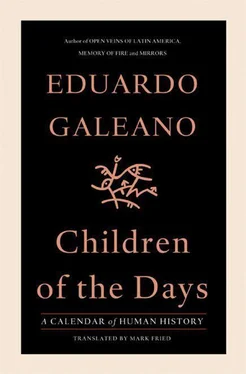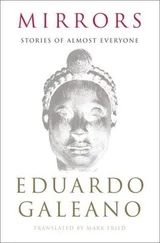In 1954 a Communist demonstration marched through the streets of Mexico City.
Frida Kahlo was there in her wheelchair.
It was the last time she was seen alive.
She died shortly thereafter, without fanfare.
A number of years passed before the huge uproar of Fridamania awakened her.
A just restitution or just business? Did this woman, who hated the pursuit of success and prettiness, deserve this? Did the artist of pitiless self-portraits, complete with unibrow and moustache, and bristling with pins and needles and the scars of thirty-two operations, deserve such treatment?
What if all this were much more than a profit-making manipulation? What if it really were time’s homage to a woman who turned her agony into art?
In 1994 the immortal one died.
His life ended but he lived on.
According to the constitution of North Korea, written by himself, Kim Il Sung was born on the first day of the New Era of Humanity and he was its Eternal Leader.
The New Era he inaugurated carries on. So does he: Kim Il Sung continues ruling from his statues, which happen to be the country’s tallest edifices.
July 9. THE SUNS THE NIGHT HIDES
In the year 1909 Vitalino was born in Brazil’s Northeast.
And the dry earth, where nothing grows, became wet earth to bring forth its children of clay.
In the beginning these were toys shaped by his hands to keep him company in childhood.
The passing of time turned his toys into small sculptures of tigers and hunters, workers with their hoes digging into the hard earth, desert warriors hoisting their rifles, caravans of refugees fleeing drought, guitar players, dancing girls, lovers, processions, saints.
Thus Vitalino’s magic fingers told the tragedy and the festivity of his people.
July 10. MANUFACTURING NOVELS
On this fateful day in 1844, the French were left with nothing to read. The magazine Le Siècle published the final installment of the nineteen-chapter adventure novel devoured by all France.
It was over. What now? Without The Three Musketeers , in reality four, who would risk his life, day in, day out, for the honor of the queen?
Alexandre Dumas wrote this work and three hundred more at a pace of six thousand words a day. His envious detractors said his feat of literary athleticism was only possible because he tended to put his name on pages stolen from other books or bought from the poorly paid pen-pushers he employed.
His interminable banquets, which swelled his belly and emptied his pockets, may have obliged him to mass-produce works for hire.
The French government, for example, paid him to write the novel Montevideo or the New Troy , dedicated to “the heroic defenders” of the port city that Adolphe Thiers called “our colony” and that Dumas had never even heard of. The book raised to epic heights the defense of the port against the men of the land, those shoeless gauchos that Dumas called “savage scourges of Civilization.”
July 11. MANUFACTURING TEARS
In 1941 all Brazil wept through the first radio soap opera:
Colgate toothpaste presents .
“ In Search of Happiness! ”
The show had been imported from Cuba and adapted to the local context. The characters had plenty of money, but they were doomed. Anytime happiness was within their grasp, cruel Fate ruined everything. Three years went by like this, episode after episode, and not a fly moved when showtime arrived.
Some villages lost in the hinterland had no radios. But there was always someone willing to ride the few leagues to the next village, listen closely to the episode, commit it to memory and return by gallop. Then the rider would recount what he had heard. An anxious crowd gathered to hear his version, much longer than the original, and to savor the latest misfortune, with that unappeasable pleasure the poor feel when they can pity the rich.
July 12. CONSECRATION OF THE TOP SCORER
In 1949 Giampiero Boniperti was the top scorer of the Italian championship and its brightest star.
According to what people say, he was born backwards, kicking-foot first, and he began his voyage to soccer glory in the crib.
The club Juventus paid him a cow for every goal.
Altri tempi .
July 13. THE GOAL OF THE CENTURY
On this day in the year 2002, organized soccer’s top brass announced the result of their global online poll, “Pick the goal of the century.”
By a landslide, the winner was Diego Maradona’s in the 1986 World Cup, when he danced with the ball glued to his foot and left six Englishmen foundering in his wake.
That was the last image of the world for Manuel Alba Olivares.
He was eleven and at that magical moment his eyes tuned out forever. He kept the goal intact in his memory and he recounts it better than the best commentators.
Ever since, to see soccer and other things not quite so important, Manuel borrows the eyes of his friends.
Thanks to them, this blind Colombian founded the soccer club he leads, became and remains the coach of the team, comments on the matches on his radio program, sings to entertain the audience and, in his free time, he works as a lawyer.
July 14. THE LOSERS’ TRUNK
Helena Villagra dreamed of an immense trunk.
She opened it with a very old key and out of the trunk spilled failed shots on goal, missed penalties, defeated teams. And the failed shots entered the net, the ball gone awry corrected its flight and the losers celebrated their victory. As long as the ball and the dream kept flying, that backwards match would never end.
On this night in 1950, the eve of the World Cup final, Moacir Barbosa slept in the arms of the angels.
He was the most beloved man in all Brazil.
But the following day the finest goalkeeper in the world became a traitor to his country: Barbosa failed to block the Uruguayan goal that snatched the trophy from Brazil’s grasp.
Thirteen years later, when Maracanã stadium put in new goalposts, Barbosa took the two posts and the crossbar that had humiliated him. He chopped them up with an ax and burned the pieces until they were nothing but ashes.
The exorcism did not save him from damnation.
White was Brazil’s jersey. But once the 1950 World Cup showed white to be unlucky, it was never white again.
The final match was over, Uruguay was world champion and the fans would not leave. Two hundred thousand Brazilians had turned to stone in Maracanã stadium.
On the field a number of players still wandered about.
The two best crossed paths, Obdulio and Zizinho.
They crossed paths. They eyed each other.
They were very different. Obdulio, the victor, was made of steel. Zizinho, the vanquished, was made of music. But they were also very much alike: both had played nearly the entire championship injured, an inflamed ankle in one case, a swollen knee in the other, and not a complaint was heard from either.
Now, at the end of the match, they didn’t know if they should give each other a slug or a hug.
Years later, I asked Obdulio, “Do you ever see Zizinho?”
“Sure. Once in a while,” he said. “We close our eyes and we see each other.”
July 17. INTERNATIONAL JUSTICE DAY
The Queen said:
“There’s the King’s Messenger. He is in prison now and being punished and the trial doesn’t even begin till next Wednesday: and of course, the crime comes last of all.”
Читать дальше












